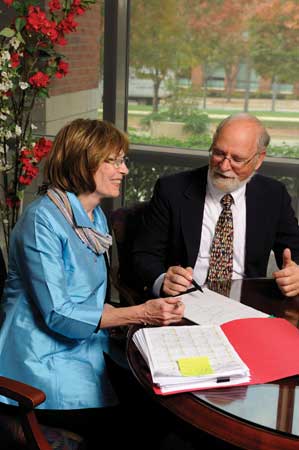Patients and Caregiver Expertise Improve Hopkins Care
by Rebecca Proch

“Cancer is messy.” Richard Dean, PhD, professor of electrical engineering at Morgan State University, speaks with a voice of too much experience. He lost
his wife Janet in 2010 after a year-long battle with ovarian cancer, and now cares for his daughter, who was diagnosed with the same disease.
Because of cancer’s unpredictable nature, Dean often had to take Janet to the ED at odd hours. “The staff was always great,” he recalls, “but you have an immune-compromised patient in a waiting room with 30 people who have the flu.”
He often talked about his family’s experiences with Janet’s nurse in Weinberg 4B, Amy Brown, RN, and wished aloud for an urgent care center for oncology. Brown later remembered those conversations and put him in touch with Sharon Krumm, PhD, RN, administrator and director of nursing in the Department of Oncology, who was working on a plan for just such a facility.
They talked, and Dean offered his expertise in queuing theory to help analyze the data and run simulations that would enable Krumm and her team to anticipate patient traffic and staffing needs. “It helped us plan the center in a meaningful way,” she says. “We were so fortunate he was willing to share his knowledge with us.” Dean’s stories as the caregiver of a Hopkins patient also confirmed for her both the need for and the urgency of her plans.
Dean knew he’d been part of something special the day he toured the newly opened center and saw a nurse “beaming…I could see how pleased he was to be able to be in a place to make a difference,” he says. “When you see nurses who are happy, you know things are going well, and you know the patients will be happy, too.”
After such a successful collaboration, Dean has no plans to stop now. He remains active on the Patient and Family Advisory Council and is currently analyzing data to improve workflow in the phlebotomy center.
“Patients see parts of the process that professionals don’t. I think the nurses especially understand that,” says Dean, who calls his combination of professional expertise and personal experience a “perfect storm” that he’s glad to offer. “When you blend it together and get the voice of the patient in the mix, you can do better medicine.”